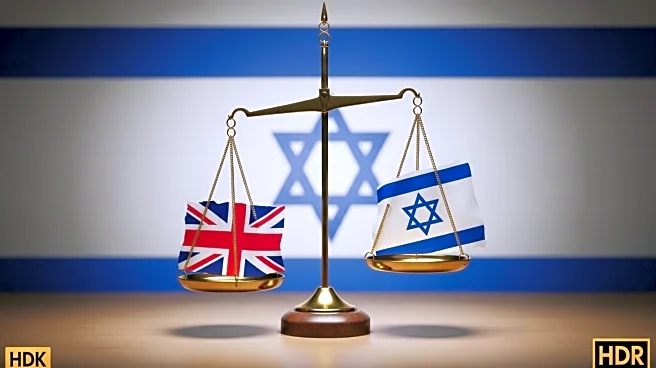What is the story about?
What's Happening?
UK Foreign Secretary Yvette Cooper has issued a warning to Israel against annexing parts of the West Bank in response to the UK's recognition of a Palestinian state. Cooper emphasized the importance of recognizing both Israel's and Palestinians' rights to their own states. This development follows the UK's announcement, alongside Canada, Australia, and Portugal, of recognizing a Palestinian state, with more countries expected to follow suit during the UN General Assembly in New York. Israeli Prime Minister Benjamin Netanyahu is under pressure from right-wing allies to declare sovereignty over parts of the West Bank, a move that could affect relations with President Trump and the Abraham Accords. Netanyahu has stated that Israel will respond after his return from the United States, where he will address the UN General Assembly.
Why It's Important?
The UK's recognition of a Palestinian state and the subsequent warning to Israel highlight the ongoing tensions in the Middle East regarding statehood and territorial claims. This move by the UK and other countries could influence international diplomatic relations and potentially impact peace efforts in the region. The pressure on Netanyahu from his allies to annex parts of the West Bank could lead to significant geopolitical shifts, affecting Israel's relations with the United States and other countries involved in the Abraham Accords. The situation underscores the delicate balance of power and the challenges in achieving a two-state solution, which remains a contentious issue in international politics.
What's Next?
Israel's response to the UK's recognition and the potential annexation of the West Bank will be closely watched by international stakeholders. Netanyahu's upcoming address at the UN General Assembly and his meeting with President Trump may provide further insights into Israel's stance and future actions. The recognition of a Palestinian state by additional countries could lead to increased diplomatic pressure on Israel and potentially alter the dynamics of Middle Eastern politics. The international community will likely continue to engage in discussions and negotiations to address the implications of these developments.
Beyond the Headlines
The recognition of a Palestinian state by the UK and other countries raises ethical and legal questions about state sovereignty and the rights of peoples to self-determination. It also highlights the long-standing cultural and historical conflicts in the region, which have implications for peace and security. The decision may influence future diplomatic strategies and international policies regarding conflict resolution and state recognition.















